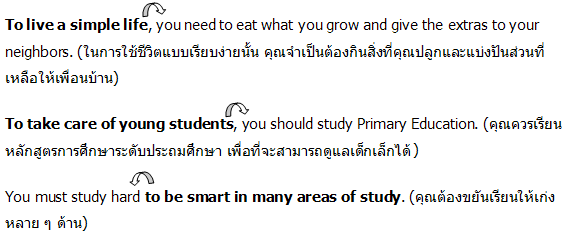8.1 Infinitive Phrase
8.1.1 รูป
เป็นกลุ่มคำที่มี infinitive หรือคำกริยาที่มี to นำหน้า (to+V base form) อาจประกอบกับคำอื่น ๆ
เช่น
To live a simple life
To be smart in many areas of study
To take care of young students
8.1.2 หน้าที่
1) ประธาน (subject) ของประโยคที่ถือเป็นเอกพจน์บุรุษที่ 3
To be smart in many areas of study depends on self-discipline to be a life-long learner.
To take care of young students is a big challenge for a new teacher.
2) กรรม (object) ของประโยคที่ตามหลังคำกริยาหลัก
We hope to live a simple life without competition.
Students want to be smart in many areas of study.
คำกริยาบางคำสามารถมี infinitive ตามหลังได้ แต่ต้องมีกรรมของคำกริยาหลักนำหน้า เช่น
| allow | force | teach | order | tell | implore |
| permit | encourage | hire | convince | appoint | expect* |
| instruct | remind | invite | ask | require | want* |
* expect และ want สามารถใช้ infinitive ตามหลังทันทีได้ด้วย
| Our neighbor invites | us | to have dinner with him every Friday. |
| Please remind | me | to check the flight schedule before leaving. |
| Did your friend tell | you | to do homework? |
| I expect | you | to take care of young students. |
3) ส่วนเสริม (complement) ใช้คู่กับ BE หรือ linking verb ทำให้ประธานมีความหมาย
สมบูรณ์และชัดเจน
The dream of many businessmen is to live a simple life without competition.
Narisa’s wish is to be smart in many areas of study.
Siri’s goal in becoming a teacher is to take care of young students.
4) ส่วนขยายประโยคบอกวัตถุประสงค์ (modifier to show purpose) ซึ่งอาจอยู่ต้นประโยค
หรือท้ายประโยค
5) ส่วนขยายคำคุณศัพท์ (to modify an adjective)
6) ส่วนขยายคำนามหรือสรรพนาม (to modify a noun or a pronoun)


